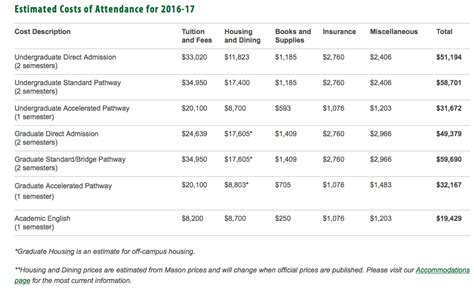Introduction

George Mason University (GMU) offers a wide range of graduate programs, providing students with opportunities to advance their knowledge and skills. However, understanding the tuition costs associated with these programs is essential for informed decision-making. This comprehensive guide will delve into the details of GMU tuition for graduate students, exploring factors that influence costs, scholarship and financial aid opportunities, and strategies for managing expenses.
Tuition and Fees Structure
GMU tuition for graduate students varies depending on the program, residency status, and course load. The university categorizes graduate programs into three funding levels: level I, level II, and level III.
Level I programs receive the highest level of funding and typically have lower tuition rates. Level II programs fall in the middle range of funding and tuition costs. Level III programs receive the lowest level of funding and generally have higher tuition rates.
Tuition Rates by Program and Residency Status
The following table outlines the tuition rates for graduate students for the 2023-2024 academic year based on program level and residency status:
| Program Level | Virginia Resident | Out-of-State Resident |
|---|---|---|
| Level I | $13,346 per semester | $22,768 per semester |
| Level II | $14,420 per semester | $24,556 per semester |
| Level III | $15,494 per semester | $26,346 per semester |
In addition to tuition, graduate students may incur other fees, including:
- Application fee: $75
- Enrollment fee: $300
- Technology fee: $183 per semester
- Student activity fee: $103 per semester
Factors Influencing Tuition Costs
Several factors contribute to the variation in tuition costs for GMU graduate students:
- Program Level: The funding level of the program determines the tuition rates. Level I programs have lower tuition costs due to higher funding, while level III programs have higher tuition costs due to lower funding.
- Residency Status: In-state residents typically pay lower tuition rates than out-of-state residents.
- Course Load: Tuition is charged per credit hour. Full-time students taking 9 or more credit hours per semester pay the full tuition amount. Part-time students taking less than 9 credit hours per semester pay a prorated tuition rate.
- Special Fees: Some programs may have additional mandatory fees or expenses associated with their curriculum, such as lab fees or practicum costs.
Scholarship and Financial Aid Opportunities
GMU offers a range of scholarships and financial aid programs to assist graduate students with tuition and living expenses. These include:
- Graduate Assistantships: Paid positions that provide students with teaching, research, or administrative duties in exchange for tuition remission and a stipend.
- Fellowships: Competitive awards that provide full or partial tuition remission and a stipend to support research or scholarly projects.
- Scholarships: Merit-based or need-based awards that provide tuition remission or financial support to eligible students.
- Loans: Federal and private student loans can be used to cover tuition and living expenses.
Strategies for Managing Expenses
Managing tuition and other expenses is a significant concern for graduate students. Here are some strategies to consider:
- Explore Scholarship and Financial Aid: Utilize the GMU Financial Aid Office to search for and apply for scholarships, fellowships, and other financial assistance programs.
- Consider Part-Time Enrollment: If possible, reduce your course load to part-time status to lower tuition costs. However, this may extend the time it takes to complete your degree.
- Apply for Graduate Assistantships: Secure a graduate assistantship to receive tuition remission and a stipend.
- Negotiate Tuition Reductions: If you have exceptional circumstances or a strong academic record, consider negotiating with the program director to reduce your tuition costs.
- Explore Employer Tuition Reimbursement: Some employers may offer tuition reimbursement programs for employees pursuing higher education.
Conclusion
GMU tuition for graduate students varies depending on several factors, including program level, residency status, and course load. However, GMU offers a range of scholarship and financial aid opportunities to assist students with tuition and living expenses. By exploring these options and implementing effective cost-management strategies, graduate students can navigate the financial aspect of pursuing their education at GMU.
